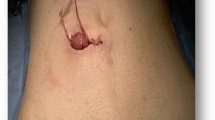Abstract
Background
Laparoscopic total mesorectal excision (LaTME) is a technically challenging for ultralow-lying rectal cancer in obese male patients. Herein, we introduced modified serial techniques “ASTRO” to facilitate LaTME, and the short-term outcomes were presented.
Methods
A prospective study (NCT05067413) was conducted between December 2020 and January 2022. The modified serial surgical techniques “ASTRO” included 5 key steps: (1) Anterior peritoneal reflection (APR) dissection at the highest line along with a “n”-shaped membrane bridge; (2) suspending the APR with a purse-string suture through the bladder peritoneum to enlarge the operating space of the anterior rectal wall; (3) traction and counter-traction continuously of the rectum applied with a cotton tape around the rectum; (4) resection of the pelvic rectum on tripartition, followed by the sequence of “posterior > anterior > lateral” principle; and (5) the trans-anterior Obturator nerve gateway was adapted to transect the distal rectum. The operative data and postoperative short-term outcomes were collected.
Results
Twenty-four consecutive patients underwent this procedure successfully. The average body mass index (BMI) was 29.9±1.3. The average of tumor height from anal verge was 4.0 cm (range, 3.0–4.5 cm). The median operating time and blood loss was 217 min (range, 165–420 min) and 50 ml (range, 20–100 ml) respectively. The anterior operation space at the midsagittal plane of the pelvis inlet was increased by 2.0 ± 0.3 cm. The calculated dominant angle was 20 ± 3°. The length of stapling line was 6.8 ± 1.0 cm with 11 cases by one cartridge and 13 cases by 2 cartridges. Eight patients developed postoperative complications including 4 with anastomosis leakage (16.7%), 2 with urinary retention (8.3%), one with anastomotic stenosis (4.2%) and one with ileus (4.2%). All the complications were relatively mild and the patients recovered well.
Conclusion
Modified serial techniques “ASTRO” could expand the operating space and facilitate LaTME in obese male patients, thereby reducing the risk of conversion to open and transanal dissection.






Similar content being viewed by others
Data availability
The data that support the findings of this study are available from the corresponding author upon reasonable request.
Change history
16 February 2023
A Correction to this paper has been published: https://doi.org/10.1007/s00423-023-02824-5
References
Oguoma VM et al (2021) Prevalence of overweight and obesity, and associations with socio-demographic factors in Kuwait. BMC Public Health 21(1):667
Kyrgiou M et al (2017) Adiposity and cancer at major anatomical sites: umbrella review of the literature. Bmj 356:j477
Murphy G et al (2018) Serum ghrelin is associated with risk of colorectal adenocarcinomas in the ATBC study. Gut 67(9):1646–1651
Panteleimonitis S et al (2020) Results of laparoscopic resection in high-risk rectal cancer patients. Langenbecks Arch Surg 405(4):479–490
Bi L et al (2020) Ligating the rectum with cable tie facilitates rectum transection in laparoscopic anterior resection of rectal cancer. Langenbecks Arch Surg 405(2):233–239
McDermott FD et al (2015) Systematic review of preoperative, intraoperative and postoperative risk factors for colorectal anastomotic leaks. Br J Surg 102(5):462–79
Tang J et al (2021) Transanterior obturator nerve gateway: a novel approach to achieving intracorporeal distal rectal transection for ultralow rectal cancer. Surg Endosc 35(5):2362–2372
Fang J, Zheng Z, Wei H (2019) Reconsideration of the anterior surgical plane of total mesorectal excision for rectal cancer. Dis Colon Rectum 62(5):639–641
Chi P, Wang XJ (2021) Significance of the intact of the fascia propria in protection of pelvic plexus during total mesorectal excision. Zhonghua Wei Chang Wai Ke Za Zhi 24(4):297–300
Buchs NC et al (2016) A two-centre experience of transanal total mesorectal excision. Colorectal Dis 18(12):1154–1161
Lacy AM et al (2015) Transanal Total mesorectal excision for rectal cancer: outcomes after 140 patients. J Am Coll Surg 221(2):415–23
Deijen CL et al (2016) COLOR III: a multicentre randomised clinical trial comparing transanal TME versus laparoscopic TME for mid and low rectal cancer. Surg Endosc 30(8):3210–5
Persiani R et al (2021) The learning curve of TaTME for mid-low rectal cancer: a comprehensive analysis from a five-year institutional experience. Surg Endosc 35(11):6190–6200
Funding
This study was supported by Wu Jie**’s Foundation Special for Clinical Research (No. 320.6750.2021-04-02).
Author information
Authors and Affiliations
Contributions
Jianqiang Tang and Yefeng Yin contributed to the study concept and design. All authors generated the literature strategy and filtered through the identified studies. Yefeng Yin wrote the main manuscript text and prepared Figures 1, 2, 3, 4, 5 and 6 and Video S1. Jianqiang Tang and Yefeng Yin critically revised the manuscript. Jianqiang Tang and Yefeng Yin provided critical feedback on the manuscript. All authors contributed to the article and approved the submitted version.
Corresponding author
Ethics declarations
Competing interests
The authors declare no competing interests.
Conflict of interest
The authors declare no competing interests.
Additional information
Publisher's note
Springer Nature remains neutral with regard to jurisdictional claims in published maps and institutional affiliations.
Supplementary Information
Below is the link to the electronic supplementary material.
Supplementary file1 (MOV 534303 KB)
Rights and permissions
Springer Nature or its licensor (e.g. a society or other partner) holds exclusive rights to this article under a publishing agreement with the author(s) or other rightsholder(s); author self-archiving of the accepted manuscript version of this article is solely governed by the terms of such publishing agreement and applicable law.
About this article
Cite this article
Yin, Y., Zhuang, M., Hu, X. et al. Modified serial techniques “ASTRO” facilitated laparoscopic total mesorectal excision for ultralow-lying rectal cancer in obese male patients: how we do it (with video). Langenbecks Arch Surg 408, 41 (2023). https://doi.org/10.1007/s00423-023-02801-y
Received:
Accepted:
Published:
DOI: https://doi.org/10.1007/s00423-023-02801-y




